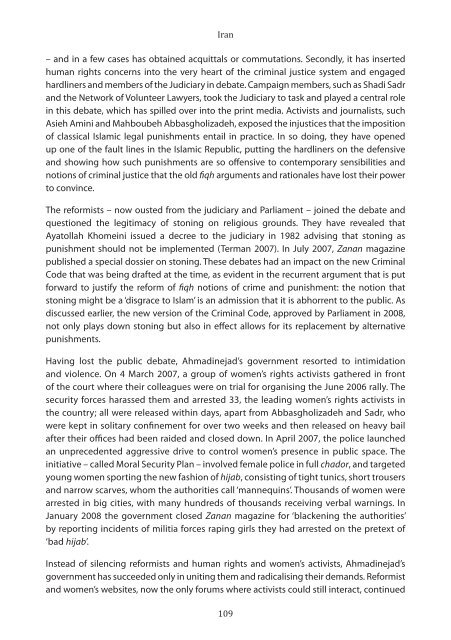control and sexuality
control and sexuality
control and sexuality
- No tags were found...
Create successful ePaper yourself
Turn your PDF publications into a flip-book with our unique Google optimized e-Paper software.
Iran– <strong>and</strong> in a few cases has obtained acquittals or commutations. Secondly, it has insertedhuman rights concerns into the very heart of the criminal justice system <strong>and</strong> engagedhardliners <strong>and</strong> members of the Judiciary in debate. Campaign members, such as Shadi Sadr<strong>and</strong> the Network of Volunteer Lawyers, took the Judiciary to task <strong>and</strong> played a central rolein this debate, which has spilled over into the print media. Activists <strong>and</strong> journalists, suchAsieh Amini <strong>and</strong> Mahboubeh Abbasgholizadeh, exposed the injustices that the impositionof classical Islamic legal punishments entail in practice. In so doing, they have openedup one of the fault lines in the Islamic Republic, putting the hardliners on the defensive<strong>and</strong> showing how such punishments are so offensive to contemporary sensibilities <strong>and</strong>notions of criminal justice that the old fiqh arguments <strong>and</strong> rationales have lost their powerto convince.The reformists – now ousted from the judiciary <strong>and</strong> Parliament – joined the debate <strong>and</strong>questioned the legitimacy of stoning on religious grounds. They have revealed thatAyatollah Khomeini issued a decree to the judiciary in 1982 advising that stoning aspunishment should not be implemented (Terman 2007). In July 2007, Zanan magazinepublished a special dossier on stoning. These debates had an impact on the new CriminalCode that was being drafted at the time, as evident in the recurrent argument that is putforward to justify the reform of fiqh notions of crime <strong>and</strong> punishment: the notion thatstoning might be a ‘disgrace to Islam’ is an admission that it is abhorrent to the public. Asdiscussed earlier, the new version of the Criminal Code, approved by Parliament in 2008,not only plays down stoning but also in effect allows for its replacement by alternativepunishments.Having lost the public debate, Ahmadinejad’s government resorted to intimidation<strong>and</strong> violence. On 4 March 2007, a group of women’s rights activists gathered in frontof the court where their colleagues were on trial for organising the June 2006 rally. Thesecurity forces harassed them <strong>and</strong> arrested 33, the leading women’s rights activists inthe country; all were released within days, apart from Abbasgholizadeh <strong>and</strong> Sadr, whowere kept in solitary confinement for over two weeks <strong>and</strong> then released on heavy bailafter their offices had been raided <strong>and</strong> closed down. In April 2007, the police launchedan unprecedented aggressive drive to <strong>control</strong> women’s presence in public space. Theinitiative – called Moral Security Plan – involved female police in full chador, <strong>and</strong> targetedyoung women sporting the new fashion of hijab, consisting of tight tunics, short trousers<strong>and</strong> narrow scarves, whom the authorities call ‘mannequins’. Thous<strong>and</strong>s of women werearrested in big cities, with many hundreds of thous<strong>and</strong>s receiving verbal warnings. InJanuary 2008 the government closed Zanan magazine for ‘blackening the authorities’by reporting incidents of militia forces raping girls they had arrested on the pretext of‘bad hijab’.Instead of silencing reformists <strong>and</strong> human rights <strong>and</strong> women’s activists, Ahmadinejad’sgovernment has succeeded only in uniting them <strong>and</strong> radicalising their dem<strong>and</strong>s. Reformist<strong>and</strong> women’s websites, now the only forums where activists could still interact, continued109


